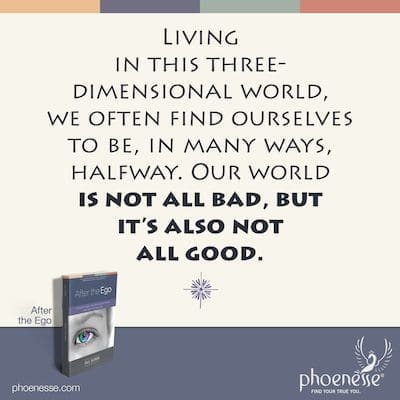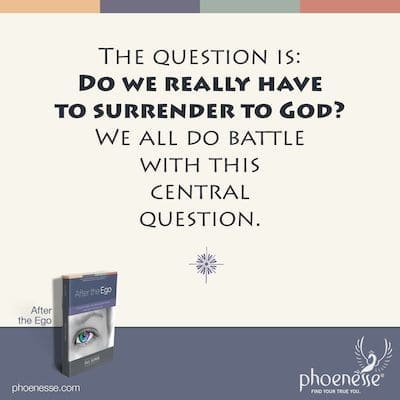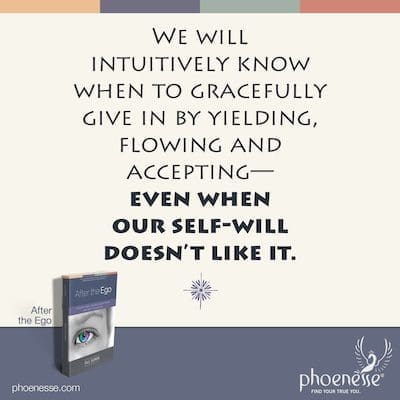It’s not easy to talk about cause and effect on this three-dimensional level. But let’s try. We can start by saying that at the lowest level of development—on the scale of consciousness—there is no cause and effect. Or at least there doesn’t appear to be any. As we raise our level of consciousness, we are able to see new horizons. From our new perspective, we are able to see how effects are connected to causes we previously didn’t even know existed. When we crest the hill and reach the point where consciousness becomes completely God-infused, cause and effect will no longer exist.
Here we see that, once again, the lowest forms of consciousness have something in common with the highest forms. But there’s an enormous difference in what they hold, in terms of attitudes and underlying feelings and thoughts. We can easily understand that primitive consciousness sees the world as an unconnected series of events that are unrelated to cause and effect. It may be harder for us to understand how in the highest realms it doesn’t exist at all. And this reality is nearly impossible to convey using human words.

Here on Earth, every act has its consequence. That’s not so hard to realize. It’s not quite as easy to see that the same relationship exists between our thoughts or our subtle inner attitudes and the overall circumstances of our life. But the more developed we become, the more we will be able to perceive cause and effect on these less obvious levels of consciousness. On this spiritual path, such perceptions gradually become more acute, and in fact this is very strongly emphasized.
If we commit some overt act—let’s say we kill another person—the consequences will be obvious. But we are also killing another person when we malign them. We do this through our questionable accusations, blindness, stubbornness or ill will; when we refuse to give another person the benefit of the doubt; when we don’t try to use honest communication or openness to create a different reality. Such secret “killing” has consequences that are just as severe as physical killing.
At first, the effects of this kind of action might be hard for us to perceive. But as we raise our consciousness, we will start to see there’s a definite connection between cause and effect. This exists even if the cause was not an overt act but a hidden thought we had previously ignored.
In our current state of consciousness, living in this three-dimensional world, we often find ourselves to be, in many ways, halfway. Our world is not all bad, but it’s also not all good. Our personalities too are not all bad, but also not all good. We don’t live in heaven, but we also don’t live in hell. Our lives represent both extremes.
Many of us do not believe there are other realms—other worlds—and so we also doubt there are other states of consciousness. But by virtue of the fact we are so halfway, this is a clear indication our sphere cannot possibly be the only reality there is. If there is some good in us and in our world, then greater degrees of goodness must exist. So it only makes sense that a plane exists that is all goodness. The same, of course, applies to the bad. If there is a little bad in us and in our world, spheres of consciousness must exist where there is more bad, and eventually, where all is bad.
We’re also halfway about cause and effect, or more correctly, in our perception of cause and effect. What changes as we develop is not the object of our perception. What changes as we grow is our vision.
An act cannot be reversed. Whatever the momentary consequences are, they are irreversible. Later on, we may be able to modify the act, perhaps by seeing it was a mistake and trying to correct it. We might see the inner current that led us to do the act. And we may use this as material to raise our consciousness and widen our perception and vision. Working in this way, we may be able to neutralize the effects of a negative act. But at the moment it happens, the act is irreversible and the consequences can’t be annulled.
If there are consequences in that moment which result from the act, we may be able to eliminate them in time, after some time has passed. So we can gradually begin to see the relationship—the connection—between cause and effect and time.
Our state of development creates a reality that corresponds to it. Our current reality contains three dimensions: time, movement and space. What we also experience is a certain degree of cause and effect. If we can’t see how our acts lead to specific consequences, we won’t be able to use them as the indispensable tools they can be for helping us develop our soul.
For example, if we don’t believe a negative thought leads to particular, tangible results, why would we be motivated to correct our thought? But if, over time, we see there is an effect, we can go about correcting the thought so that, once again, in time we can eliminate the effects. It’s not any different with our positive, truthful, life-affirming thoughts, actions and attitudes. They all have corresponding effects that are desirable.
If we remain unaware of the link between cause and effect in all areas of our lives, believing the effects are haphazard and just coincidences, we won’t work to improve the causes we create. We won’t be able to perceive that the supreme power in the universe is goodness and love. And therefore the truth of this will not be able to support and strengthen us.
Now let’s say we are compelled by our inner forces to impulsively do something destructive. This may cause an instantaneous pain and remorse. We long to be in a state of being where we can undo this act. We want to live as though it never happened. Yet we know that in this world we’re living in, that’s impossible.
How can it be, then, that there’s no cause and effect in higher realms? Maybe we can sense, deep in ourselves, the possibility that “underneath” this current level of cause and effect, another level exists. There, we’re completely untouched by both the cause we set in motion and the effect we have brought about. What is this part that is unaffected? This is our Higher Self, the divine part of ourselves that does not participate in any of our negative thoughts. It’s also not part of our destructive actions and attitudes.
But the layers of our personality that are still mired in false perceptions—and which therefore hold untruthful, unloving attitudes and do destructive acts—have to work themselves out of this quagmire. And this can only happen in time. So time and cause and effect are different manifestations of the same reality, and are intrinsically connected. The two cannot be pulled apart.
Making the connection
Perhaps we’re starting to see that this three-dimensional world—with its cause and effect, with its duality, with its limitation of time, space and movement—is directly linked with the distortions, impurities and limitations of our perception and our vision. Our three-dimensional perception is, in itself, an untruthful view of the world. We can add to this untruthful equation the limitation of time, space and movement, together with the struggle that comes with duality, along with the law of cause and effect.
But when we add all this together in the right way, we have the very tools our soul needs to transcend this entire realm of consciousness. Now we start to see that our perception is the cause of certain actions, which unavoidably lead to certain effects. But these effects can be the very medicine we need to overcome our distorted perceptions…which create the causes….which in turn create the effects.
There are states of consciousness—the highest states—where only the highest, best, most beautiful and most creative causes are set into motion. Here, in this enlightened state of consciousness, cause and effect are immediately—almost simultaneously—discerned. In such a sphere, there is no gap of time between cause and effect. So the cause is the effect. The thought is the act.
Even the most secret, subtle attitude creates instant consequences. There is no space in between an effect and its cause. As all becomes one, on this level of being, cause and effect truly become one.
This is why, during certain moments of grace, we can sense the realm deep within in which no matter what happens, we remain untouched. No matter what, we are unalterably pure. No matter what, we are divine. We are good in our essence. For our essence is the essence of all. It is God.
On the other hand, there exists a primitive state of consciousness where even the most obvious act appears to be isolated, with no consequences or connection, with no cause and no effect. When a primitive person kills someone, they may truly believe their act will have no further consequences, either for the victim or for themselves. So it won’t occur to this person to search for the cause within. They won’t try to find out what created their desire to commit the act. As such, the act never becomes the medicine that could, in time, cure the disease of evil.

Total surrender to God
Surrendering to God is an innate movement of our soul. This is our ultimate fate. If we do not do this, we can’t fulfill our task and we can’t fulfill ourselves. The question is: Do we really have to surrender to God? We all do battle with this central question. And yet our resistance to following this call of our soul is the very thing that causes all our discomfort: our pain, our suffering, our anxiety, and our discontent.
So how does this topic connect with cause and effect? It’s like this: Surrendering to God, or our unwillingness to surrender, affects every conceivable part of our life, inner and outer. Let’s add some more light to how this could be so.
What are some of the natural effects of surrendering completely to God? Since this is our natural soul movement, then to surrender to God is to fulfill our own destiny. Doing so will bring our lives into balance and bring harmony into our whole being.
In our mental body, we will be ruled by truth, having realistic understanding, and clear vision and perception. In our mind we will be at peace. Confusions will clear up and conflicting perceptions will resolve. Frustration then will disappear. With this kind of enlightenment, we will have insight about apparent conflicts. And these insights will make all the pieces of the great puzzles in our life fall into place.
On the level of our emotions, our mental reconciliation of opposites is going to create an entirely new way of being, feeling and reacting. For instance, it will no longer appear to us that loving will weaken or humiliate us. Quite to the contrary, we’ll discover, loving creates dignity and a healthy sense of pride.
When we become willing to surrender to God, we avoid one of the biggest pitfalls of being human. We avoid the temptation to surrender to greater power structures that are negative. But the minute we resist—obstructing our natural soul movement to surrender to God, which is our destiny—we must succumb to a substitute. We will end up in false surrender. Friends, it’s very important we understand this.
If we fear someone in authority—it doesn’t matter whether this authority really is abusing their power or we only imagine it—it’s because we depend on this authority figure in ways that are both tangible and intangible. Because of our dependency and fear, we respond by either submitting and selling out and then hating ourselves for this, or by rebelling blindly against the authority in an effort to avoid hating ourselves. We are trying to preserve our dignity.
But in this situation, this is not true dignity. This is nothing more than a blind reaction based on emotional reflex and stirred up turbulent feelings we are barely aware of. In any case, we are not clear about what’s happening. And since we lack true insight, we can’t tell whether the authority is really abusive or if we’re just acting like a child.
If we are genuinely surrendering to God in all areas of our life, we will easily see an unworthy authority for what it is: someone who wants to subdue us, abuse us, exploit us and trample our dignity. It doesn’t matter whether this person is our boss or a mate we depend on financially and whose love we need and crave. If our surrender to God is our key position—our main emphasis and our primary attitude—we will trust God and we will know that trusting God is totally justified.
From here, we will be able to find the courage to risk losing the one we feel we need. When we set God above all, we have the clear vision to see when a human authority is abusive. And then we can make the choice to pay the price needed to gain our freedom. We may have to give up whatever this authority holds out for us. But we will be able to do this if our dignity is more important. Our autonomy can only grow from the rich soil of total inner surrender to God.
Giving ourselves over to God will then have a further consequence. We will need to make a change. For we’re going to need to change our situation if we want to get our real needs met without enslaving ourselves as we’ve been doing. This may mean getting a new position, a new boss, or a new partner. But the new authorities we attract in life will be, like us, autonomous people who are following their call to set God above all else.
They won’t need to abuse their power. For they won’t be wielding a power built on the backs of needy people. It’s also possible we’ll now find that the very same people—our boss or our mate—react differently to us with our new and improved attitude. The change in us may engender a change in them. Since they too may also have had a conflict between their Higher Self and Lower Self. In resolving their inner conflict, they may discover a new respect for our dignity and set us free, allowing the relationship to become a mutual giving and receiving.
In the event it’s our own perception that’s distorted—assuming that any and all authority is out to humiliate and abuse us—then our total surrender to God will surface our misconception. Then we will be able to adjust our perception to match reality. This is how to unwind any compulsion we have to rebel against rightful authority, which is the kind that merely asks us to contribute our rightful share to a mutual venture.
Hiding behind our rebellion to authority is often our own desire to have power over others. Secretly, we want to be the ones who get to abuse power. We may have never thought of it like this. But this is what happens when we let our self-will run the show. Often, embedded in our distorted self-will are feelings of powerlessness and humiliation whenever our self-will is not fulfilled. This leads us to believe that we have two options: become the world’s greatest power—God—or be annihilated.
In an effort to avoid total annihilation, we may tend to bow to substitute powers, rather than bend to God’s will. This is why we may choose to submit to another person who is seemingly stronger than us. That person may be a boss, a partner, or a dictator. We hope that by serving them, we will gain a superior position ourselves.
Or maybe we’ll turn money or position into the power we are seeking. These then become our substitute Gods. Or perhaps we feel powerful when we keep ourselves aloof from other people. So then we ever completely open our heart but always make ourselves desirable. This plays directly into the hands of other people’s neurotic needs and misconceptions.
Both of these things—submission to substitute authority as well as rebellion against all authority—are effects. They are the results of a cause we ourselves set into motion when we denied and obstructed our natural soul movement of surrendering to God. But as soon as we recognize God as the highest authority, everything falls into place.
Otherwise, if we refuse to do this, we must be confused about what authority we actually do need and should serve. We won’t be able to tell when it is appropriate to follow their lead, and when we should step up ourselves because self-assertion is called for.
When our primary stance is surrender to God, we are able to clearly see what is what. With a proper view of things, we can follow suit with a right action that won’t link to an inner conflict. We will admit that we have needs. We’ll also admit that we need a leader or authority in certain parts of our life. Plus we’ll admit that we have an important role to play. And in accepting our part, we will have a heightened sense of ourselves. We will feel true dignity.
From this place, when we follow a leader, we won’t lose our soul. Because our soul will belong to God, and God returns it to us cleaner, stronger and with even more autonomy. When we refuse to surrender to God and his will, we resist our own destiny. In doing so, we create real guilt that permeates our being and weakens us. So many of our self-punishing patterns—self-doubt, hesitation, weakness—result directly from this.
It doesn’t matter how many psychological explanations we may find—and on their level, they may be perfectly true—we can never reverse and transform this self-defeating pattern unless we heal spiritually. And we can only do this when we give over all of ourselves—in every area of our lives, in all ways—to the great creator, God.
When we do this—and of course this is not a one-time event, but one we must do repeatedly, daily, regarding all issues in our life—we will find a new strength and sense of self we never knew we had before. This will almost seem like a paradox. Deep down we have always feared that if we gave ourselves to God, we would lose ourselves. Now we find that—as a very real and palpable reality—Jesus’ words were true: We must lose ourselves in God in order to find ourselves.

Positive aggression
With our new strength, we will spontaneously have the wisdom to know when to give in with grace, and when to use positive aggression. From our instantaneous knowing will flow the appropriate act. Energetic, positive, aggressive movements will replace denial and childish, destructive rebellion. We will intuitively know when to gracefully give in by yielding, flowing and accepting—even when our self-will doesn’t like it. This will replace humiliating, self-denying submission based on fear and an inability to trust life.
In either case, we will be able to make new choices in a whole new way. Whereas in the past we might have weakly submitted, now we may yield or follow. Either way, we can maintain our dignity. Or perhaps we’ll find that positive aggression is the order of the day. Then we will be able to stand up for ourselves, rather than blindly and destructively rebel as we might have before.
This time we can act in a new spirit, out of different motives and with a clearer vision. So our stance will have an entirely different effect on others, for the tone of our aggression will change. It could also happen that we come to realize that what the situation really calls for is not fighting, but giving in. We see that it is fair, justified, necessary, right and good for everyone involved. We now understand there was no injustice or abuse after all, so there’s no need for aggression.
Positive aggression, however, is not only used for the purpose of exposing injustice and abuse. It’s not only an action we take in response to something, it is also an initiating action. Whether within ourselves or out in the world, this kind of action—positive aggression—is needed to expand, to move out, to create, to improve. Without this energetic movement surging ahead, we can’t transform our negative material.
Such an organic, healthy surging movement is not depleting or effortful. Rather, it’s a freeing release that energizes our whole being. But this only happens when our organic, appropriate aggression aligns with God’s will. The positive new reality we are striving for can only come to pass when we have freed ourselves from the confusions that accompany our denial of our soul movements—of our inner call to give ourselves over to God.
When we step into the new reality, we won’t have to ask if we should stand up and assert ourselves or give in and follow. We won’t doubt the nature of those we need and depend on. And we won’t question the motives of authority. We won’t have to grapple with our intellect alone, which could never give us the insight we want. We will enjoy spontaneity. The knowledge we need will land in our lap, strong and clear, without nagging doubt.
We will flow from the center of ourselves where God lives and reigns, where Christ is king, and where all is right in our world: in our actions, in our perceptions, in our knowledge, in our reactions and in our feelings. The peace and single point of focus we long for lies in this key: total surrender to God. Friends, use this key.
“My beloved friends, the blessings extended to all of you are specifically directed at this time toward helping you to give over to Him Who holds you, Who contains you, Who makes you safe and secure, Who infuses His truth and His love into all your being, so that you become an instrumentality for Him. Make it a reality. Be blessed.”
–The Pathwork Guide

Next Chapter
Return to After the Ego Contents
Read Original Pathwork Lecture #245: Cause and Effect on Various Levels of Consciousness


